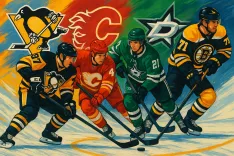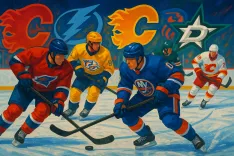NHL Offseason Grades: Evaluating Moves as the 2025-26 Season Kicks Off

The NHL 2025-26 Season Begins: A Look at Offseason Moves
As October arrives, the excitement of the new NHL season fills the air. With the 2025-26 regular season on the horizon, it’s time to take stock of how all 32 teams fared during the offseason. Were their moves sufficient to meet their goals — be it rebuilding or contending for the Stanley Cup? This report card assesses each team's summer transactions and offers grades based on the quality and relevance of their maneuvers.
Team-by-Team Analysis
The Anaheim Ducks initially received a B- for their offseason, adding players like Chris Kreider and trading John Gibson's contract. A long-term deal for Mason McTavish boosts their prospects, but risks remain with Trevor Zegras's future.
The Boston Bruins face criticism for lacking direction. Despite key players like David Pastrnak, Charlie McAvoy, and Hampus Lindholm, their limited moves, such as the questionable contract given to Tanner Jeannot, leave fans uncertain.
Meanwhile, the Buffalo Sabres continue to struggle with more than $5.3 million in unused salary cap space, raising questions about their commitment to improvement after years without playoff appearances.
The Calgary Flames, who almost made the playoffs last season, opted for no offseason changes, leaving them with $11 million in unused cap space. Their failure to bolster their offense is seen as a missed opportunity.
The Carolina Hurricanes made notable additions with Nikolaj Ehlers and K’Andre Miller, raising expectations that they could further improve during the season.
In Chicago, the Blackhawks remain stagnant, relying on inexperienced talent while facing uncertainty with Connor Bedard's future. They added veterans but still lack a substantial upgrade.
The Colorado Avalanche's offseason saw them retain key players, offering a sense of stability, albeit with questions brewing around some veteran signings.
Despite a solid young core, the Detroit Red Wings' slow rebuild is becoming a point of contention, given their unused salary cap space and overall roster similarity to past years.
On a contrasting note, the back-to-back Stanley Cup champions, the Florida Panthers, managed to strengthen their roster while keeping crucial players at reasonable contracts, despite injuries to stars like Aleksander Barkov.
Next, the Los Angeles Kings' decisions have faced scrutiny as they diminished defense strength without bolstering their roster for an improved offense.
The Minnesota Wild solidified its future by re-signing Kirill Kaprizov, making a strong statement with a burgeoning roster and an impressive farm system.
Meanwhile, the Nashville Predators had a subdued offseason, raising concerns about their direction amidst player contracts lacking the potential to transform the team.
The New Jersey Devils secured Luke Hughes long-term and added valuable depth with Connor Brown and Evgenii Dadonov, a savvy move for a competitive edge.
In New York, the Islanders' farm system enjoyed improvement, facilitating a better outlook for the future despite an initially unimpressive roster.
Similar sentiments echoed for the New York Rangers, who upgraded their defensive pairings but still grapple with depth concerns moving forward.
Though the Ottawa Senators’ trade for Jordan Spence was low-key, it represents a steady, if not spectacular, offseason.
The Philadelphia Flyers gambled on Trevor Zegras’s future potential amid a goaltending crisis, presenting fans with both hope and uncertainty.
As expected, the Pittsburgh Penguins are making headlines with their roster decisions, opting for continuity as they avoid major trades while seeking to remain competitive.
The San Jose Sharks' acquisition of veterans may garner additional wins but leaves fans wary about long-term prospects.
In Toronto, the Maple Leafs' decision to trade Mitch Marner has fans questioning if they can make the most of this open opportunity, with new faces stepping in to fill his shoes.
In a surprising turn, the Vancouver Canucks secured key players like Brock Boeser but still have lurking questions about the health and performance of their core stars.
Finally, the Washington Capitals had a quiet offseason, retaining key personnel as they prepare for another competitive season despite not making many adjustments.
Thus, as the 2025-26 NHL season gears up, teams find themselves in various stages of evolution based on their offseason decisions.









